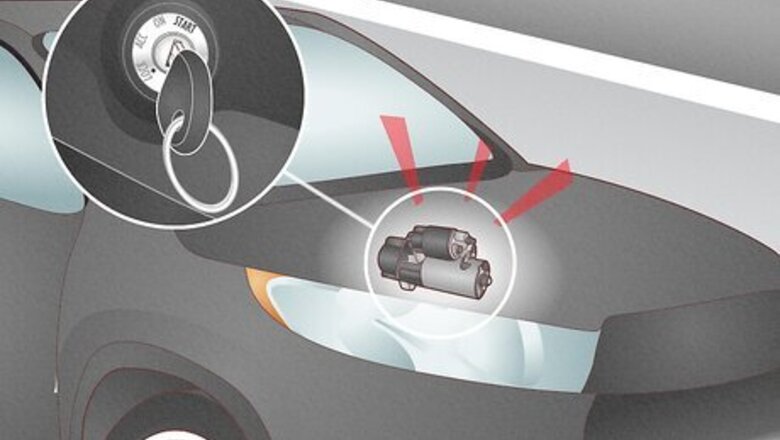
views
Bad Starter
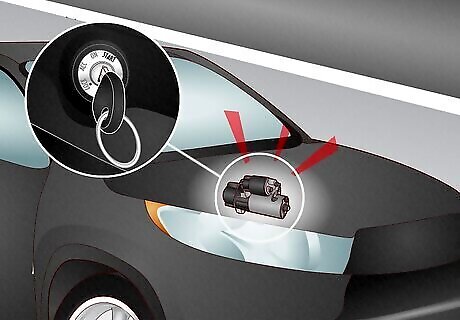
A dying starter is the most likely cause for a tough start. If your vehicle runs 100% fine after it kicks on but it takes a few cranks to start, the starter itself is likely on the verge of failing. When you turn the key, the starter motor engages and begins cranking the engine to start. If the starter is failing though, it will require extra time to build up enough crank to start the engine. Additional Symptoms: Your car requires multiple key turn attempts to start, you hear clicking and whirring before the engine turns over, or smoke comes out of the hood when you crank the engine. The Fix: The starter likely needs to be replaced. Either see a mechanic or replace the starter yourself. The Cost: Expect to spend $500-800. If you do it yourself, it may only cost $50-100 in parts.
Battery Issues
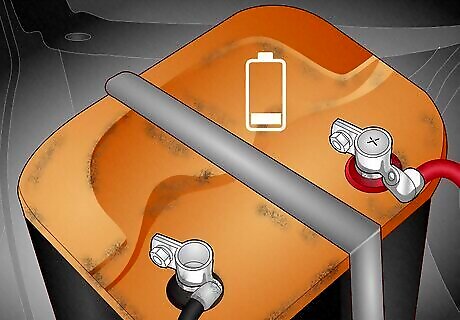
The battery powers your vehicle, so a weak battery could cause starting issues. Your vehicle gets its electrical power from two sources. The alternator works to convert some of your engine’s power into electrical power, and the battery stores power to turn it on when you turn the key over. So, a car that struggles to start may have a dying battery issue. Additional Symptoms: The electrical in your vehicle starts dim then gets brighter, your car won’t start or requires jumps, the engine cranks multiple times when you start the car, you smell sulfur, or the engine backfires. The Fix: A new battery is an easy fix. Buy a replacement identical to your old one and use a wrench to change the battery. The Cost: A new battery should only run $180-300. If you pay a mechanic, expect to spend an additional $100 or so.
Dying Alternator
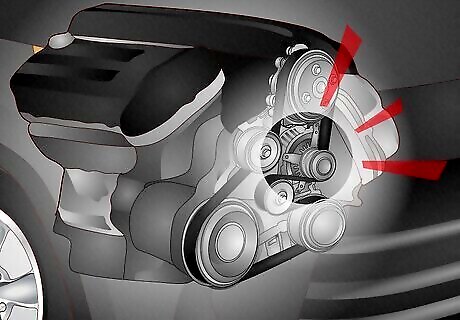
A struggling alternator may cause early trouble after the engine starts. The alternator is responsible for keeping the engine on after the battery does its job. If your ignition feels normal but the car struggles a bit after starting, the alternator could be going bad. The alternator converts mechanical energy to electrical energy to keep your electrical system running, so if it’s starting to go bad your engine may struggle to stay on at first after the engine starts. Additional Symptoms: You smell burning rubber, your car makes howling noises, your dashboard seems to go dim randomly, or your car dies after running for a while. The Fix: See a mechanic to have the alternator replaced. This is a pretty tough DIY job, so leave it to a pro unless you really know your way around an engine bay. The Cost: You’ll likely have to spend $100-400 on a new alternator.
Fuel Pump Failure
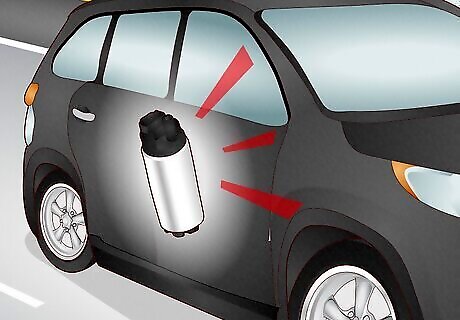
A clogged or dying fuel pump won’t get enough gas to the engine. The fuel pump forces gas from your fuel tank to the engine. If your engine isn’t getting enough fuel, it may sputter and struggle to function once it starts. This may smooth out as the fuel lines begin to equalize, but early trouble is a symptom of a bad fuel pump. Additional Symptoms: The car surges forward in odd bursts while you drive, your mileage is poor, the check engine light pops on, your engine overheats, or you hear whirring noises coming from the gas tank. The Fix: The fuel pump needs to be replaced, so see a mechanic. The Cost: You may spend $400-1,200 on a new fuel pump depending on your car’s make and model.
Coolant Sensor Problems
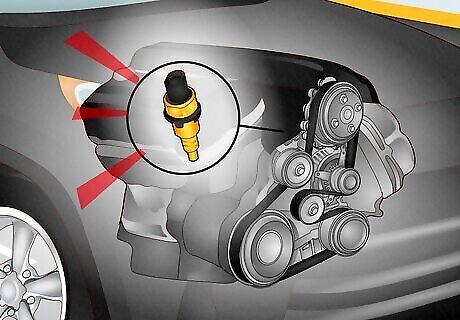
A bad coolant sensor will trick your engine into starting poorly. The coolant sensor is responsible for adjusting the flow of coolant and the engine performance based on how those two factors line up. Because a cold engine needs more fuel and less coolant when it starts, a bad sensor will cause problems when the engine starts, and when it gets really hot later on; the engine will often seem fine in the middle, though. Additional Symptoms: You may notice engine overheating, bad fuel economy, a check engine light that pops on when you start the car (and may go away later), or black smoke coming from your engine. The Fix: The sensor needs to be replaced. This is normally a very niche repair, so leave it to a professional mechanic. The Cost: You’ll likely need to spend $300-500 on a new coolant sensor.
Dirty Air Filter
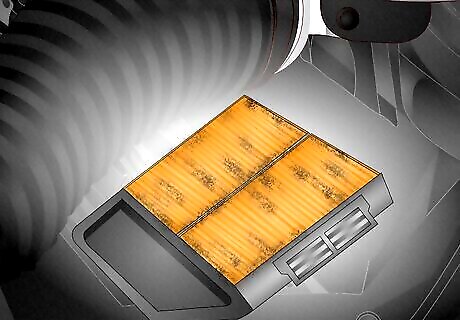
A clogged air filter can cause the engine to struggle to get started. The air filter prevents emissions from escaping and ensures that dirty air stays out of your engine. But if there isn’t enough air getting through the filter, your car may struggle to start as the engine’s spark + fuel + air mixture is off. The symptoms may dissipate as your engine smooths out. Additional Symptoms: The check engine light comes on, you have poor fuel economy, your car smells like gas, or your acceleration is poor. The Fix: People may recommend cleaning the filter, but that can just introduce contaminants. It’s cheap enough for a professional to replace the filter that it’s worth just swapping it out. The Cost: A mechanic shouldn’t charge more than $50-100 for an air filter replacement. The exceptions are BMW, Mercedes, and other luxury German cars. Those filters are harder to access and may cost $200-400.
Distributor Cap Worn Out
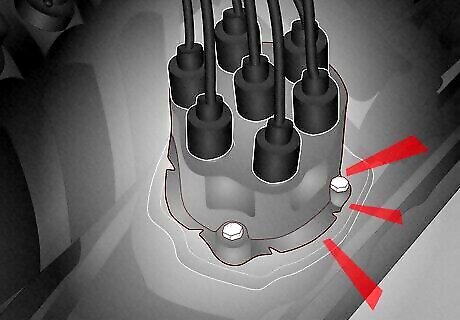
On older cars, a dying distributor cap can cause starting issues. The distributor cap sends electricity from the ignition coil to the spark plugs. If the distributor cap is on the fritz, your engine may struggle to turn over when you crank the engine. This could smooth out if the distributor cap kicks back into alignment as the engine warms up. Additional Symptoms: Your engine misfires, cranks but won’t start, it struggles to turn over when you start the engine, and your check engine light comes on. The Fix: See a mechanic to have the distributor cap inspected and replaced. The Cost: Expect to spend around $75-200 on a new distributor cap.
Poor Weather
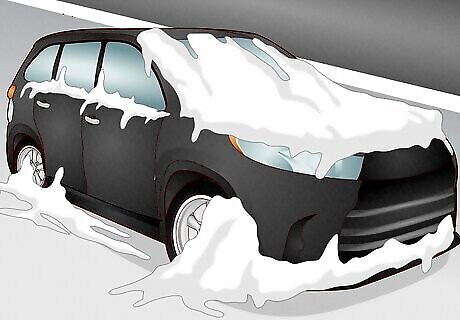
If it’s extremely cold, your engine will naturally take time to warm up. This one isn’t a big deal. It’s perfectly natural for an engine to require some extra time to start when the battery is cold. So long as the engine does actually kick on, you’ve got nothing to worry about. Additional Symptoms: None. The Fix: None. So long as the engine does actually start, your vehicle is perfectly fine. The Cost: No need to pay for anything. However, you may want to stash aside $100-200 for a new battery if it’s taking much longer than normal for the car to start. If the battery is taking much longer to start, it might be a sign it’s starting to die.



















Comments
0 comment